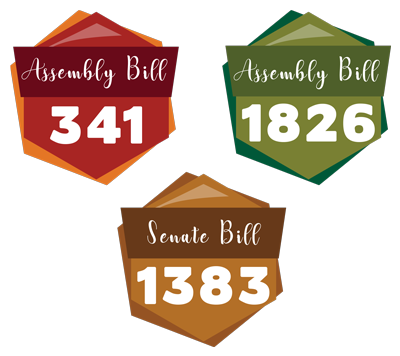Locally and statewide, businesses must adhere to the collective rule of three California recycling laws enacted by our legislature in the past decade.
Assembly Bill 341, Assembly Bill 1826 and Senate Bill 1383 mandate the proper disposal of California businesses’ “dry recyclables” – i.e. bottles, cans, paper and high-grade plastics – as well as organic materials, including yard waste and food waste.
Collectively, these three bills are the backbone of a sweeping statewide effort to greatly increase recycling and ultimately reduce emissions from methane and other so-called short-lived climate pollutants that emanate from landfilled waste.
Here’s a brief primer on the bills and what they require, along with information on what business owners in California can and should be doing to abide by them.
Assembly Bill 341: Approved in 2012, AB 341 was designed to require commercial trash customers – and multifamily apartment complexes – to do what residential customers had already been doing for decades: recycle regularly.
With the ultimate goal of diverting waste from landfills, AB 341 requires California to reach a recycling goal of 75 percent. With a 2020 end date, and with all Ventura County area businesses in compliance, this bill has effectively come to term, successfully.
To keep making progress, “please just keep recycling,” said Mike Harrison, Engineering Manager for Ventura-based trash hauler E.J. Harrison & Sons.
Assembly Bill 1826: This 2014 legislation took recycling to the next level, implementing a requirement that California businesses also recycle their organic materials, including food waste, yard waste and food-soiled paper waste. The required amount depends on how much waste each business generates.
2020 is the last defined year of AB 1826 – which is now superseded by Senate Bill 1383 (see below). All of Harrison’s commercial customers have received outreach and education on the legal requirements of AB 1826. “We’ve signed up customers for organic recycling in the amount of our current material processing capacity,” Mike Harrison said, “and we encourage everyone to get on board.”
For details on taking part in the organics recycling program, call Harrison’s Donald Sealund at 805-647-1414, ext. 4318, or email [email protected].
Senate Bill 1383: Signed into law in 2016, SB 1383 has taken organics recycling to yet another level – assigning actual reduction percentages to the disposal of commercial organic material.
According to the ambitious bill, statewide organic waste in 2020 must be cut to 50% of 2014 levels. By 2025, the state seeks a 75% reduction rate; also that year, California’s Department of Resources Recycling and Recovery (CalRecycle) aims to divert at least 20% of edible waste for further human consumption. CalRecycle enforcement oversight is set to begin in 2022.
To the California recycling industry, the looming mandates of SB 1383 represent both a daunting challenge and a unique opportunity to show the world how truly effective sustainability efforts can be. Successful implementation of the law could serve as a model for governments across the country and around the globe.
To meet the needs, the state’s annual organics processing capacity will have to expand significantly, meaning industry leaders and jurisdictions will need to invest in infrastructure and prioritize processing contracts.
Harrison and local jurisdictions are striving to meet the mandates, Mike Harrison said. Among other things, organic waste processing facilities in Ventura County are in the works, making their way through the permitting and funding pipelines.
Meeting the mandates will mean rate adjustments. “As we continue to work toward getting these facilities operational, we will keep our franchise cities updated on our needs and our progress,” Harrison said.


Comments are closed